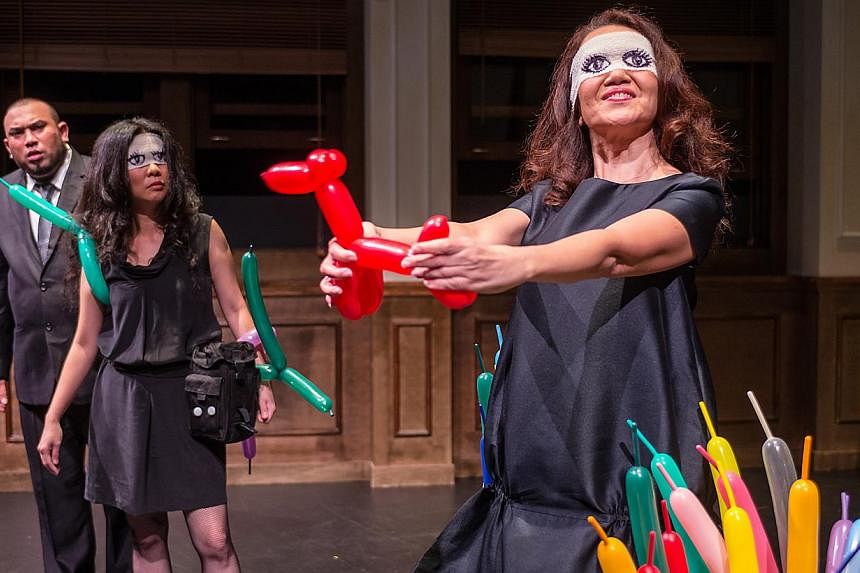There is an enormous weight to this beloved Kuo Pao Kun work, one of the late theatre pioneer's heaviest allegories about Singapore's socio-political consciousness.
But with this delightfully subversive revival at Esplanade's theatre retrospective, The Studios: fifty, comes a sudden sense of lightness - director Jeff Chen makes it his goal to slaughter all sacred cows and leaves their proverbial carcasses bleeding all over the stage.
Kuo's episodic text is an open invitation of sorts to directors, written completely in prose and verse with no regard for stage directions or any indication of voices or character. On a basic level, Descendants narrates the trials and travels of the great 15th-century Chinese admiral and explorer Zheng He, from the painful act of losing his manhood to his loneliness and excitement on the open sea.
But it was also this 1995 play that popularised Kuo's notion of the "cultural orphan" in describing Singapore: a people uprooted from their native cultures and roughly transplanted into a blank space; a nation castrated. It has almost always been interpreted in a hauntingly beautiful way, with its long poetic flights of fancy and dense, graphic metaphors.
So to call Chen's treatment of this near-sacred text "shocking" would be to put it lightly. He brings the cabaret to the church, so to speak, storming out of left field with loud, bright, over-the-top images in his wake, a riotous and absolutely delicious circus of feather boas, squeaky balloons and mannequin appendages.
This Descendants is a marriage of audaciously crass, low-brow visual humour with voiceovers largely faithful to Kuo's text. The narration - recorded before rehearsals started - begins with Cultural Medallion recipient T. Sasitharan, a close friend and frequent collaborator of Kuo's. These recordings reflect the who's who of the Singapore theatre scene, including the likes of Lim Kay Siu, Janice Koh, Noor Effendy Ibrahim and Remesh Panicker, each bringing their own interpretation of the text to the microphone - from Siti Khalijah Zainal's obsessively cheerful description of penises suspended from the ceiling, to Karen Tan's solemn near-whisper pondering Zheng He's funeral.
With this deep reverence to the original text comes a wonderfully wicked irreverence. As the text marches on overhead, a team of five very persuasive actors - who almost never speak - go on visual tangents, both reacting to and riffing on the spoken word. Jean Ng, Nora Samosir, Timothy Nga, Koh Wan Ching and Najib Soiman break all the boundaries of sexual jokes and taboos, creating grotesque tableaux of coitus with broken mannequins, toying with Singapore's love of productivity-related acronyms, and in a joyful, indulgent scene, they end up with a colourful pool of balloon penises strewn around their feet in what could be described as a game of "mine is bigger than yours".
But these absurd images always carry a sense of purpose. Every scene produces that same sort of visceral, instinctive reaction that comes with Kuo's work. As several different methods of castration and sterilisation are described, we hear the painful squeak of fingernails against the skin of a balloon, just about to pop, the sort of awful sound that compels us to scrunch up our shoulders and face, just as one might when facing impending genital mutilation. In another scene, a punching bag falls onto the stage floor repeatedly with a terrifying WHOMP, WHOMP, WHOMP; you can almost feel the pulley system straining under the weight as it pile-drives its way through the text.
Several audience members left during the show, others clutched at each other in hysterical fits of giggles.
But I found it utterly refreshing to see that bald sexual innuendo rubbing up against the seriousness of Kuo's text, his insights and provocations still uncannily on-point 20 years after the play was written. There was no malice in this production, but a playful nod to old gods and new directions, one most visible in the long-running visual gag that Chen has been keeping up since his return to Singapore theatre in 2012.
Those who watched Nine Years Theatre's adaptation of the courtroom drama Twelve Angry Men that same year might have felt a strange sense of deja vu as they filed into the theatre - to see the exact same stuffy jury room with its forced perspective and clean, mahogany lines. Chen also used the set (by Wong Chee Wai) for his 2013 work LIFT: Love Is Flower The, an experimental riff on the meaning of happiness.
To see the set reused in such a confounding array of contexts gives it the strange effect of mirroring Descendants as a play that has been interpreted in so many different ways but has always kept its heart. Some parts of the text, delivered in rare moments of quiet, made Kuo's words even more poignant.
"Departing is my arriving," Kuo writes, "Wandering is my residence." And then the actors go, drifting off the stage, leaving us to return to a Singapore that has never stopped changing, but is both completely different and exactly the same.
Follow Corrie Tan on Twitter @CorrieTan
book it
DESCENDANTS OF THE EUNUCH ADMIRAL
Where: Esplanade Theatre Studio
When: Friday at 8pm, Saturday at 3pm and 8pm, Sunday at 3pm
Admission: $30 from Sistic (call 6348-5555 or go to www.sistic.com.sg; excludes booking fee)
Advisory: This production contains mature themes. Recommended for patrons aged 16 and above


